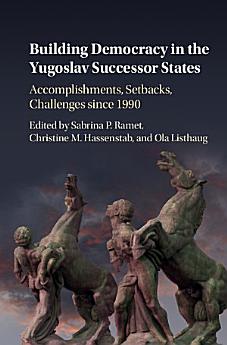Building Democracy in the Yugoslav Successor States: Accomplishments, Setbacks, and Challenges since 1990
About this ebook
About the author
Sabrina P. Ramet is a Professor of Political Science at the Norwegian University of Science and Technology (NTNU), Trondheim. She is also a member of the Royal Norwegian Society of Sciences and Letters, a member of the Norwegian Academy of Science and Letters, and a Research Associate of the Science and Research Centre of the Republic of Slovenia. She is the author of twelve scholarly books, among them, Thinking about Yugoslavia: Scholarly Debates about the Yugoslav Breakup and the Wars in Bosnia and Kosovo (Cambridge, 2005) and The Three Yugoslavias: State-Building and Legitimation, 1918–2005 (2006). She is also editor or co-editor of thirty-two previous books, including Central and Southeast European Politics since 1989 (Cambridge, 2010) and Religion and Politics in Post-Socialist Central and Southeastern Europe (2014). Her articles have appeared in Foreign Affairs, World Politics, Slavic Review, and other journals. As an undergraduate, Ramet studied philosophy at Stanford University, California and subsequently received her PhD in political science from the University of California, Los Angeles in 1981.
Christine M. Hassenstab is a retired attorney, who also worked as an Adviser in the EU Grants Office at the Norwegian University of Science and Technology (NTNU), Trondheim. She earned her BA in History from the University of Washington, her JD from Golden Gate University School of Law, California, and her PhD in Sociology from NTNU in 2010. She worked as a Public Defender in King County, Washington, from 1987 to 2001, and is the author of Body Law and the Body of Law: A Comparative Study of Social Norm Inclusion in Norwegian and American Laws (2015), and co-editor of Gender (In)equality and Gender Politics in Southeastern Europe: A Question of Justice (with Sabrina P. Ramet, 2015).
Ola Listhaug, is Professor of Political Science in the Department of Sociology and Political Science at the Norwegian University of Science and Technology, Trondheim, and a Senior Research Associate of the Peace Research Institute Oslo (PRIO). He is an elected member of the Royal Norwegian Society of Sciences and Letters and the Norwegian Academy of Science and Letters. He has published numerous articles, and is editor of Civic and Uncivic Values in Serbia: The Post-Milošević Era (with Sabrina P. Ramet and Dragana Dulić, 2011), Serbia and the Serbs in World War Two (with Sabrina P. Ramet, 2011), Civic and Uncivic Values in Macedonia: Value Transformation, Education, and Media (with Sabrina P. Ramet and Albert Simkus, 2013), Civic and Uncivic Values in Kosovo: History, Politics, and Value Transformation (with Sabrina P. Ramet and Albert Simkus, 2015), and Bosnia-Herzegovina since Dayton: Civic and Uncivic Values (with Sabrina P. Ramet, 2013). He is also co-author of Losers' Consent: Elections and Democratic Legitimacy (with Christopher J. Anderson, André Blais, Shaun Bowler and and Todd Donovan, 2005). He has contributed chapters to Democratic Transition in Slovenia: Value Transformation, Education, and Media (2006) and Democratic Transition in Croatia: Value Transformation, Education, and Media (2007).




